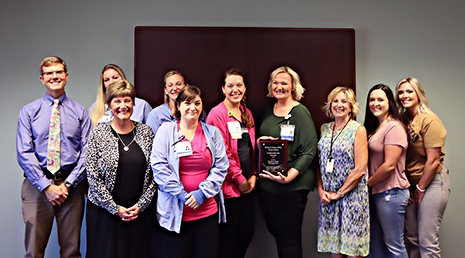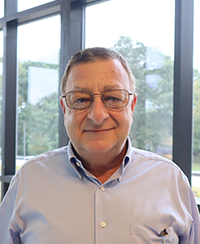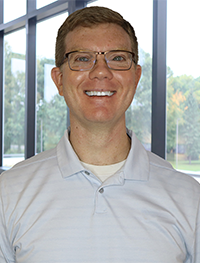 It's known to the community of Fulton County as a Maternity Oasis, and that's exactly what the team at Woodlawn Health is providing mothers-to-be in surrounding communities—a thriving place to seek care when there are no other options close by.
It's known to the community of Fulton County as a Maternity Oasis, and that's exactly what the team at Woodlawn Health is providing mothers-to-be in surrounding communities—a thriving place to seek care when there are no other options close by.
Maternal mortality is an urgent public health crisis both nationally and across the state. It is further compounded by obstetric (OB) closures increasing at an alarming rate.
In Rochester, Indiana, the closest hospitals providing maternity care are miles away, making it difficult for women who live in the “in-between" areas to seek the care they desperately need before delivering a baby. But Woodlawn Health made it their mission to create a space that can fill the gap in prenatal care essential to every new mother.
Alan Fisher, CEO of Woodlawn Health, says instead of looking at the hospital and community as a desert, they chose to define their unit as an oasis—serving the under-served.
define their unit as an oasis—serving the under-served.
“Our community has no OB services within a 25-mile radius," Fisher said. “Our Maternity Oasis gives expecting mothers care by highly skilled and compassionate caregivers. In the case of emergencies, it allows mothers quick access to triage services instead of driving long distances for care."
Woodlawn Health's Maternity Oasis has been so successful that it was recently awarded Indiana's 2023 Community Star by the National Organization of State Offices of Rural Health (NOSORH). The award is given to one rural hospital per state for having the largest impact on changing rural health.
 Dr. Christopher Ricketts has been delivering babies at Woodlawn Health for over 20 years. He says it's an honor to work for a self-sustaining, independent hospital who puts its patients' needs first.
Dr. Christopher Ricketts has been delivering babies at Woodlawn Health for over 20 years. He says it's an honor to work for a self-sustaining, independent hospital who puts its patients' needs first.
“The award recognizes the top to bottom, end to end commitment Woodlawn Health has made to the patients we serve," Dr. Ricketts said. “This would not have come to fruition without buy-in from our most recent hire all the way up to our Board. Awards such as these are not the culmination of a single person's efforts but instead reflect a community and a culture of commitment to the women and babies we are privileged to care for."
Dr. Ricketts says it is disheartening that many OB units have had to close their doors nationwide—but says he's fortunate to provide care in his rural community to hopefully curb that statistic. (story continued below)
“If there was no unfortunate context of maternity deserts, there would be no significance in having an oasis," Dr. Ricketts said. “One of the challenges everyone in a rural area must face is access to quality health care. Most health conditions do not evolve quickly into life-threatening situations, but those of us who practice maternity and neonatal care understand labor can change very quickly from routine to critical."
Providing the oasis is the essential first step in saving lives by addressing the needs of new mothers in a small community. However, the work doesn't end there. Fisher says there must be a corresponding legislative push to keep the Maternity Oasis open to mothers who need it most.
